Physiologically - Study guides, Class notes & Summaries
Looking for the best study guides, study notes and summaries about Physiologically? On this page you'll find 1936 study documents about Physiologically.
Page 4 out of 1.936 results
Sort by
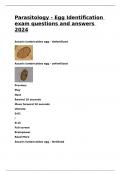
-
Parasitology Exam 1 with 100% correct answers 2024
- Exam (elaborations) • 25 pages • 2024
-
- $13.99
- + learn more
Parasitology Study of the most common mode of life on earth Parasitology Centered on animal parasites of humans, domestic animals, and wildlife Previous Play Next Rewind 10 seconds Move forward 10 seconds Unmute 0:00 / 0:15 Full screen Brainpower Read More Animal parasites Parasitology is centered on Parasite An organism that lived in or on another organism and either harms the host or lives at the expense of the host Parasitic clams Alter their man...
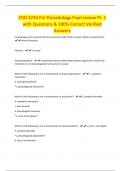
-
ZOO 4234 FIU Parasitology Final review Pt. 1 with Questions & 100% Correct Verified Answers
- Exam (elaborations) • 12 pages • 2024
-
- $12.99
- + learn more
Parasitology is the study of the most common mode of life on earth, which is centered on? - Animal Parasites Phoresis - "to carry" Protocooperation - mutually beneficial relationship between organisms in which the interaction is not physiologically necessary for survival Which of the following is not a characteristic of protocooperation? - a. symbiotic interaction b. mutually beneficial *c. physiologically necessary* Which of the following is not a characteristic of mutualism? - a. sy...
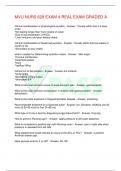
-
MVU NURS 629 EXAM 4 REAL EXAM GRADED A Clinical manifestation of physiological jaundice - Answer- *Usually within first 2-4 days of life *Not lasting longer than first 2 weeks of onset *Due to fast breakdown of RSCs *Liver immature and poor dietary intake
- Exam (elaborations) • 4 pages • 2024
-
- $17.99
- + learn more
MVU NURS 629 EXAM 4 REAL EXAM GRADED A Clinical manifestation of physiological jaundice - Answer- *Usually within first 2-4 days of life *Not lasting longer than first 2 weeks of onset *Due to fast breakdown of RSCs *Liver immature and poor dietary intake. Clinical manifestation of breast fed jaundice - Answer- *Usually within first few weeks to month of life *Secondary to poor intake what to assess for Determining hydration status - Answer- *skin turgor *mucous membranes *peripheral pu...
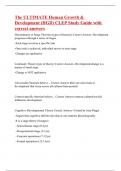
-
The ULTIMATE Human Growth & Development (HGD) CLEP Study Guide with correct answers
- Exam (elaborations) • 49 pages • 2023
-
- $13.49
- + learn more
Discontinuity or Stage Theories (types of theories) Correct Answer--Development progresses through a series of stages -Each stage involves a specific task -Once task is achieved, individual moves to next stage -Changes are qualitative Continuity Theory (type of theory) Correct Answer--Development/change is a matter of small steps -Change is NOT qualitative Universality theorists believe... Correct Answer-there are universals to development that occur across all cultures/time-periods ...
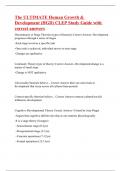
-
The ULTIMATE Human Growth & Development (HGD) CLEP Study Guide with correct answers
- Exam (elaborations) • 49 pages • 2023
-
- $14.49
- + learn more
Discontinuity or Stage Theories (types of theories) Correct Answer--Development progresses through a series of stages -Each stage involves a specific task -Once task is achieved, individual moves to next stage -Changes are qualitative Continuity Theory (type of theory) Correct Answer--Development/change is a matter of small steps -Change is NOT qualitative Universality theorists believe... Correct Answer-there are universals to development that occur across all cultures/time-periods ...
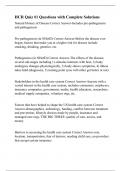
-
HCR Quiz #1 Questions with Complete Solutions
- Exam (elaborations) • 10 pages • 2024
-
- $13.99
- + learn more
Natural History of Disease Correct Answer-Includes pre-pathogenesis and pathogenesis Pre-pathogenesis (in NHofD) Correct Answer-Before the disease ever began; factors that make you at a higher risk for disease include smoking, drinking, genetics, etc. Pathogeneiss (in NHofD) Correct Answer-The effects of the disease; several sub-stages including 1) stimulus interacts with host, 2) body undergoes changes physiologically, 3) body shows symptoms, 4) illness takes hold (diagnosis), 5) turning ...
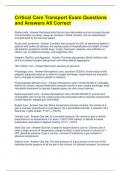
-
Critical Care Transport Exam Questions and Answers All Correct
- Exam (elaborations) • 27 pages • 2024
-
Available in package deal
-
- $12.99
- + learn more
Critical Care Transport Exam Questions and Answers All Correct Sickled cells - Answer-Red blood cells that are less deformable and do not pass through microcirculation as easily, cause an increase in blood viscosity, and are sequestered and destroyed by the liver and spleen Acute chest syndrome - Answer-Condition that accounts for 25% of premature deaths in patients with sickle cell disease; the leading cause of hospitalization and death of sickle cell patients; symptoms include fever, cou...
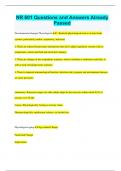
-
NR 601 Questions and Answers Already Passed
- Exam (elaborations) • 73 pages • 2024
- Available in package deal
-
- $11.99
- + learn more
NR 601 Questions and Answers Already Passed Developmental changes Physiological 1. Reduced physiological reserve of most body systems, particularly cardiac, respiratory, and renal. 2. There are reduced homeostatic mechanisms that fail to adjust regulatory systems such as temperature control and fluid and electrolyte balance. 3. There are changes in the sympathetic response, which contribute to orthostasis and falls, as well as lack of hypoglycemic response. 4. There is impaired immunological fun...
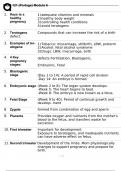
-
BIOD 121 Module 6 exam Portage learning SPRING 2024
- Exam (elaborations) • 15 pages • 2024
-
Available in package deal
-
- $20.49
- + learn more
Keys to a healthy pregnancy 1) adequate vitamins and minerals 2) healthy body weight 3) controlling health conditions 4) avoid teratogens 2. Teratogens Compounds that can increase the risk of a birth defect. 3. Examples of teratogens: 1) Tobacco: miscarriage, stillbirth, LBW, preterm 2) Alcohol: fetal alcohol syndrome 3) Drugs: LBW, miscarriage, birth defects 4. 4 Key pregnancy stages: Fertilization, Blastogenic, Embryonic, Fetal 5. Blastogenic stage (Day 1 to 14): A period of ra...
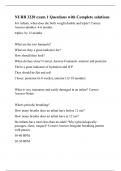
-
NURB 3220 exam 1 Questions with Complete solutions
- Exam (elaborations) • 7 pages • 2024
-
- $17.49
- + learn more
For infants, when does the birth weight double and triple? Correct Answer-doubles: 4-6 months triples: by 12 months What are the two fontanels? What are they a great indicator for? How should they look? When do they close? Correct Answer-Fontanels: anterior and posterior The're a great indicator of hydration and ICP They should be flat and soft Closes: posterior (6-8 weeks), anterior (12-18 months) What is very immature and easily damaged in an infant? Correct Answer-Neuro What...

How much did you already spend on Stuvia? Imagine there are plenty more of you out there paying for study notes, but this time YOU are the seller. Ka-ching! Discover all about earning on Stuvia


